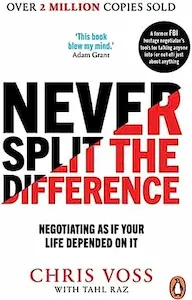Never Split the Difference - Summary
Chris Voss and Tahl Raz

Introduction
“Never Split the Difference” is a book written by Chris Voss and Tahl Raz that explores the art of negotiation. Voss is a former FBI hostage negotiator who has used his experience to develop a set of techniques that can be applied to any negotiation scenario. In this book, he shares his insights and strategies for negotiating effectively, whether in business or in personal relationships.
The Importance of Listening
One of the key takeaways from “Never Split the Difference” is the importance of listening. Voss argues that listening is the most important skill in any negotiation, as it allows you to understand the other person’s perspective and build rapport. He emphasizes the need to listen actively, which means not just hearing what the other person is saying, but also paying attention to their tone of voice and body language.
To illustrate the importance of listening, Voss shares a story about a hostage negotiation he was involved in. The hostage-taker was demanding a helicopter to escape, but Voss realized that what he really wanted was to be heard and understood. By listening to the man’s grievances and acknowledging his feelings, Voss was able to build trust and eventually convince him to surrender.
The Power of Mirroring
Another technique that Voss advocates for is mirroring, which involves repeating the last few words of what the other person said. This technique can be used to build rapport and encourage the other person to continue talking. By mirroring the other person’s words, you show that you are listening and that you understand their perspective.
For example, if someone says, “I’m really frustrated with the service I received,” you could respond by saying, “You’re frustrated with the service?” This simple technique can help to defuse tension and create a more productive conversation.
Using Labels
Voss also recommends using labels, which are short statements that summarize the other person’s feelings or perspective. By using labels, you can show that you understand the other person’s point of view and create a sense of empathy. This can be particularly effective in a negotiation, as it can help to build trust and encourage the other person to be more open.
For example, if someone says, “I’m not interested in your proposal,” you could respond by saying, “It sounds like you’re not convinced by what I’m saying.” This label acknowledges the other person’s perspective and encourages them to explain their reasoning.
The Importance of Calibrated Questions
Calibrated questions are open-ended questions that encourage the other person to reveal more information. Voss argues that calibrated questions are a powerful tool for negotiation, as they can help you to uncover the other person’s underlying motivations and concerns.
For example, instead of asking, “Do you want to buy this product?” you could ask, “What is it about this product that interests you?” This question encourages the other person to explain their reasoning and can help you to tailor your pitch to their needs.
The Value of Emotional Intelligence
Throughout the book, Voss emphasizes the importance of emotional intelligence in negotiation. He argues that understanding and managing your own emotions, as well as recognizing and responding to the emotions of others, is critical to achieving a successful outcome.
To illustrate this point, Voss shares a story about a negotiation he was involved in with a CEO who was angry and confrontational. Rather than responding in kind, Voss used his emotional intelligence to remain calm and defuse the situation. By acknowledging the CEO’s feelings and responding in a non-confrontational way, Voss was able to reach a mutually beneficial agreement.
The Danger of Anchoring
Anchoring is a cognitive bias that occurs when people rely too heavily on the first piece of information they receive. Voss warns against using anchoring in negotiation, as it can lead to unrealistic expectations and impede progress.
For example, if you are negotiating a salary and the other person makes an initial offer of $100,000, you could respond by saying, “That’s a good starting point, but let’s explore some other options.” This response acknowledges the other person’s offer without anchoring the negotiation to a specific number.
The Importance of Preparation
Finally, Voss emphasizes the importance of preparation in negotiation. He argues that doing your research and understanding the other person’s perspective can give you a significant advantage in any negotiation scenario.
For example, if you are negotiating a business deal, you should research the other person’s company and industry to understand their priorities and concerns. This can help you to tailor your pitch and anticipate their objections.
Conclusion
“Never Split the Difference” is a valuable resource for anyone looking to improve their negotiation skills. By emphasizing the importance of listening, emotional intelligence, and preparation, Voss provides a comprehensive guide to negotiating effectively in any scenario. Whether you are negotiating a business deal or resolving a personal conflict, the techniques outlined in this book can help you to achieve a successful outcome.